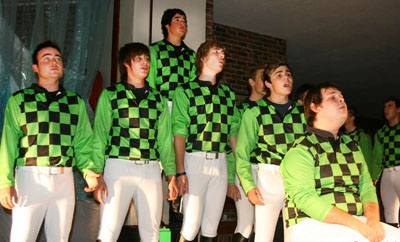 |
|
The men from Veritas show why they won the National “Sêr” competition.
Photo: Provided
|
After many months’ practice, sweat and late nights, the “sêr” group of Veritas, a men’s residence at the University of the Free State (UFS) managed to make name nationally and bring home a coveted crown.
At the recent National “Sêr” Competition hosted by Stellenbosch University (US), this group of talented young men made a clean sweep when they snatched up the prizes in the Men’s Residence section, the best performance of a song for their gospel medley, as well as the prize for the overall winners.
The competition, which took place at three venues, was attended by approximately 3 000 people. The competition was presented in the Endler Hall of the Music Conservatory of the US and the halls of the Secondary School Bloemhof and Paul Roos Gymnasium. According to Corneil Müller, one of the adjudicators at the Endler Hall, the majority of the adjudicators agreed that Veritas deserved the first prize. The other adjudicators at this hall were Karen Meiring, Bondina Osterhoff, Saranti Rheeders, Leonore Bredekamp and Sidumo Jacobs.
According to the head student of Veritas and second tenor in the “sêr” group, the group did not really expect to win all the prizes. However, when the audience gave them a standing ovation, the group started to think that the first prize really was within their reach.
Their gospel medley is close to the hearts of the entire group. It is the men’s way to say thank you for their talents. “It is a very special song for us – it means a lot to each one in our group,” says Herman. To win the prize with for this medley for the best performance of a song was the cherry on the top for these men. “We did not even know that such a prize existed!” says Herman.
The ladies of Sonnedou Residence’s “sêr” group also participated in the competition. This section of the competition was won by Vergeet-My-Nie from the North-West University (NWU).
Media Release
Issued by: Lacea Loader
Director: Strategic Communication (actg.)
Tel: 051 401 2584
Cell: 083 645 2454
E-mail: loaderl@ufs.ac.za
7 September 2010